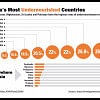Banking sector's health weakens
The financial health of the banking sector is weakening due to rising non-performing loans, a lack of corporate governance and increasing capital shortfall, according to an Asian Development Bank report released yesterday.
The Manila-based multilateral lender has also expressed concerns about low profitability, operational inefficiency and ineffective legal framework in the banking sector.
Soon Chan Hong, senior economist at the ADB resident mission, presented the report styled “Asian Development Outlook 2019” at his Agargaon office yesterday.
“The economic growth of Bangladesh is largely depending on financing provided by banks. If banks face problems, the economy gets affected,” he told The Daily Star.
Non-performing loans (NPLs) surged to Tk 93,911 crore last year from Tk 50,156 crore four years ago, according to Bangladesh Bank data.
Weak governance in the banking sector is responsible for the high ratio of expenditure to income, soaring operating expenses and appointments of inefficient people in the management, said Chan Hong.
The ratio of NPLs steadily decreased to 6.1 percent in 2011 from 41.10 percent in 1999, but the bad debts soared in recent years, he said.
A central bank initiative to tighten the loan classification policy in 2012 could not play an effective role in reducing defaulted loans, mentioned the senior economist.
The NPL ratio at the state-run commercial banks (SCBs) in 2012 was about five times that of the private commercial banks (PCBs) and the foreign commercial banks (FCBs), the report says.
The financial health of state-run banks is relatively weaker than that of the private ones, noted Chan Hong.
As of last year, defaulted loans at eight SCBs accounted for 57 percent of the total NPLs in the banking sector.
The state-run banks, which are saddled with huge bad debts, have become a burden on the government, the report said.
Injecting capital into the state-run banks on a regular basis is not the right way to strengthen the lenders' capital base, Chan Hong said.
Since 2009, the government has injected Tk 14,505 crore into the state-owned banks.
Despite this, six state-run banks faced capital shortfall at the end of December last year.
The ADB has recommended appointing competent professionals to the board of directors at the SCBs with a view to strengthening the financial health of the lenders.
“Political appointment to the board should be avoided,” it said.
Moreover, the SCBs' management should be given full operational independence to conduct day-to-day operations, and both the board and the management be made answerable to the central bank.
The authorities should consider consolidation, merger or even privatisation of the SCBs. They should also ensure strict enforcement of existing bank rules and regulations.

 For all latest news, follow The Daily Star's Google News channel.
For all latest news, follow The Daily Star's Google News channel. 








Comments